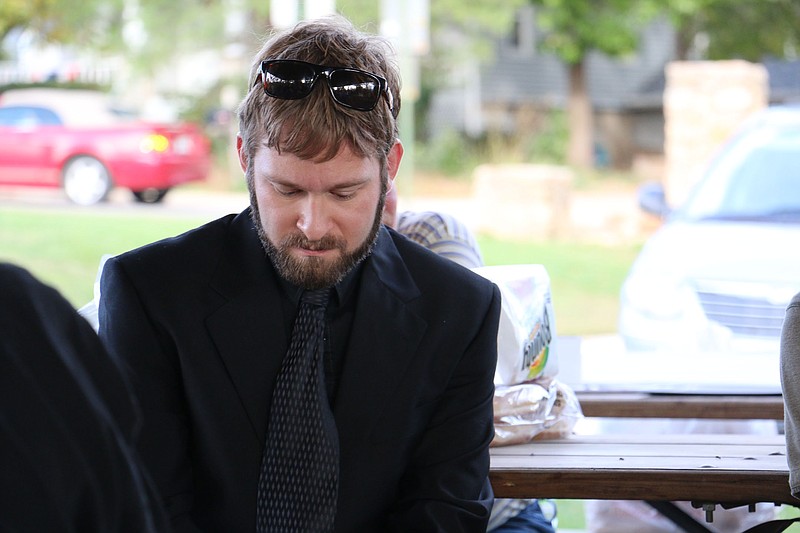Amon Macvittie said at first, he despised the Drug and DWI Court program. But he grew to appreciate it. He said those in the program have to really want to change their life.
"Every day is a challenge still. I have to keep in mind what I have to lose," Macvittie said.
His family and his job are on that list. Macvittie said his mom helped him throughout his time in the program.
"She was moral support, anything I really needed," Macvittie said. "My best friend, my ally, my guiding light."
Macvittie just graduated from Callaway County Drug Court, an intensive, supervised program that acts as an alternative to prison. He was one of five members of the Drug Court who graduated Monday afternoon.
Gary Hodges graduated from the program more than two years ago. He was in the program due to multiple DWI's.
"If it wasn't for the program, it's hard to say how my life would look," Hodges said. "I didn't have guidance of what to do to help myself."
Hodges retired from the military 10 years ago. He said he had a lot of issues in his life and often turned to drinking.
"I went to the bottle instead of looking for the right answer," Hodges said.
He said the program helped him find the right solutions. Hodges continues to attend the court's graduations and sponsors others in the program.
Drug and DWI Court requires participants to have random drug testing on average twice a week. The program also requires its participants to attend two group counseling sessions each week as well as individual counseling and a meeting with the probation officer. Participants attend a minimum of four 12-step programs a week and are required to be in school or work.
Drug Court Judge Carol England said she is thankful to employers who hire Drug Court participants. Employers who hire members of the Drug Court program get tax incentives. England emphasized that the program's participants are monitored and regularly drug tested.
Participants are also required to do at least 40 hours of community service.
They also go to court once a week to check in with the Drug and DWI Court team. That team includes a judge, a probation and parole officer, a representative from the prosecuting attorney's office, a Fulton Police officer, a Callaway County Sheriff's deputy and a drug court coordinator. The team meets once a week to discuss the program's participants and determine if any of them are having a difficult time and need extra attention.
Hodges said staying involved in the program is important to him.
"At first it seems like a lot. After you start doing it, it gets to be a routine. It gives you a structure of how to run your week," Hodges said.
That structure was important to Hodges and to his sobriety. He in part continues to be involved in the program to keep that structure in his week. Hodges has been sober for four years in February.
Callaway County's drug court became operational in April 2001. The DWI court for Callaway County started about four years ago. The Drug and DWI Court has between 25 and 40 participants at any given time. They stay in the program at least a year, sometimes longer.
Drug Court Coordinator Michael Princivalli said the Drug Court caps off at 20 participants and the DWI court at 10. However, they go over those maximum amounts at times. Callaway County averages about 15 participants in Drug Court and about 8 in DWI Court. Due to funding, Drug and DWI Court cannot take everyone, but, Callaway County Prosecuting Attorney Chris Wilson said he doesn't see many turned away.
"It's a life-changing experience for the people who graduate," Wilson said. "It really affects - in a positive way - every aspect of their life."
Drug Court also has criteria that must be met before someone will be assigned to the program. The criteria excludes violent offenders, requires the offence be a felony and the person who committed the crime must have a substance abuse problem. Wilson added that the person must express a willingness to respect the program's requirements and be open to treatment.
England said the Drug Court looks for people who have a high risk and high need, although not all of the people who participate in the program fall into that category. Wilson said he has seen judges require Drug Court for someone who has just spent 120 days incarcerated.
"I think it (Drug Court) helps as a transition from incarceration back into the community," Wilson said.
Boone County and Callaway County Drug Courts' graduation rate is between 55 and 60 percent. Since the Drug Court first started, it has graduated 865 participants. Princivalli said that success rate is in line with other drug courts across the country. He added that for those who graduate, their success rate after the program's end is high. Wilson said he doesn't like to see people in court after they've started Drug Court.
"It's not a good feeling to see someone kicked out of Drug or DWI Court," Wilson said. "It's an opportunity loss for them."
The state dismisses charges of those who successfully complete the program. Princivalli said Missouri has been labeled a leader in drug and DWI courts. The state has more drug courts per capita than any other state. Princivalli said The Missouri Association of Drug Court Professionals wants to eventually have a drug court in every Missouri county.
Macvittie said for him, drinking again would have a snowball effect on his life. It would have negative effects on his life. Macvittie said he will continue to attend meetings.
"Hopefully it (the program) will have long-lasting effects. I think it will," he said.


